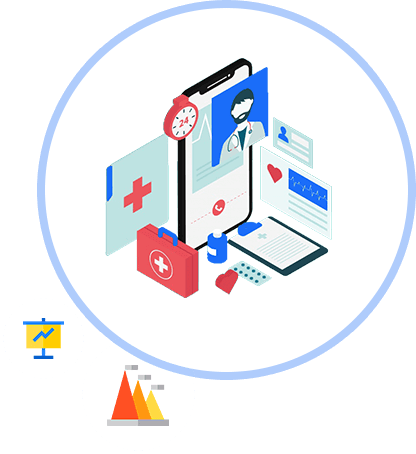Blogs
Enhancing the Abilities of Healthcare SectorServices
Solutions
Services
Solutions
Understanding Problems to Lead Change
Over 25 million people or around 8.3% of the entire United States population suffers from diabetes.
Diabetes is also linked with a broad range of complexities from heart disease and stroke to blindness and kidney disease.
Many people with diabetes are diagnosed late and develop Type 2 diabetes.
Predicting patients with Type 2 diabetes is necessary to have a better understanding of these complications that people with diabetes suffer.


With the rise of Artificial Intelligence-based approaches, we can find a solution to this issue. The core challenge is to develop an advanced software system using AI which can predict whether the patient has Type 2 diabetes or not. The AI can extract hidden knowledge from a vast amount of diabetes-related data and help identify the diabetes type 2 patients in early stages.
Defining the Solid Roadmap
The goal was to create a proprietary AI-based platform that predicts an individual’s risk for developing Metabolic Syndrome related diseases such as type 2 diabetes.
The system was based on personal, medical, diagnosis and medication data collected by a patient.
After brainstorming with the client, OSP proposed a comprehensive system which will be handled by the healthcare providers to collect, note, and store this data to help predict the pattern.


OSP engineered a brilliant system architecture to view all the required datasets with their current status easily. Our finalized conceptual system design included in-depth AI architecture diagrams, report layouts, and the screen designs. We have created an intelligent roadmap to leverage the random forest algorithm consisting of 2000 trees on the diabetes datasets.
Delivering On the Promise
Data collection and storage was the crucial part of this system to work. We simplified the data sets into four major components.
Personal data include age, sex, height and weight, whereas the lab data consists of the body measurements and data gathered from a few basic medical tests.
The lab data as per the HL7 text included the patient's BMI, respiratory rate, heart rate, temperature, systolic blood pressure, and diastolic blood pressure. We used the median of the collected data.
Providers can add the diagnostic description with automated ICD-9 coding for every patient using an advanced dashboard.


The system also included the prescribed medication for each patient for their respective diagnosis. The EMR data with complete historical data of patients were applied with random forest algorithm and log loss metric to derive the approximate possibility of a patient suffering from diabetes or not. The AI-based predictive analytics solution has the potential to identify the patients that are currently suffering from Type 2 Diabetes Mellitus.
Building to Deliver Experiences
This AI-based predictive analytics offers risk stratification that is critical for early intervention and cost-effective resource allocation by healthcare providers and payers.
The system enables to focus on people at highest risk for chronic conditions like Diabetes Type 2.
People with 95%+ accuracy are already suffering with the Diabetes Type 2, whereas the people with 60% accuracy may have a chance to get diabetes in near future.
The randomness in building the random forest algorithm helps to consider many likely explanations, where it can capture a much broader picture of the data than a single tree with autoscaling feature.


The AI-driven diabetes predictive analytics uses electronic medical record data to enhance public health by predicting the patients suffering from diabetes type 2 from a dataset of de-identified medical records. We have proved that the AI-based MVP has the potential to transform the diabetes risk prediction using advanced computational methods and algorithms. The random forest gives us a better accuracy than the logistic regression model or a single decision tree, without tuning any parameters. OSP simplified the most challenging task of identifying the patients with diabetes that were going unnoticed and help clinicians to make a better decision about the disease status.
Predicting the business future with advanced healthcare BI.
Meaningful patient engagement for personalized healthcare delivery.
Powering healthcare innovation with artificial intelligence.

"Yes, I would certainly recommend their services because they were diligent and the offered price was very reasonable which is a challenge these days to get a great product at excellent pricing."

Forging alliances with top global technology companies to find a new and better way to solve complex healthcare challenges.
The experience and dedication of the people working at OSP Labs make everything we do possible. If you’re passionate about having a powerful impact on transforming healthcare, we’d love to hear from you.
Talk to us